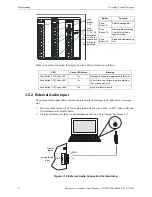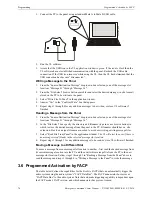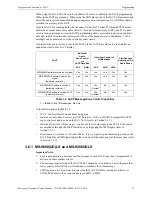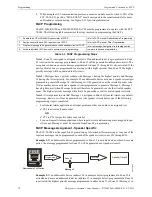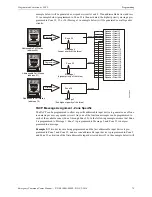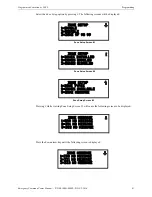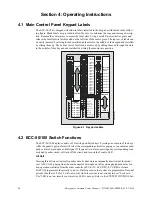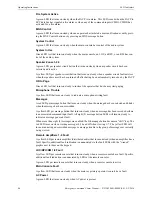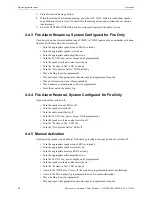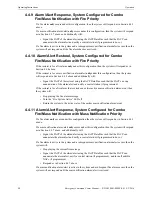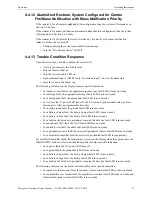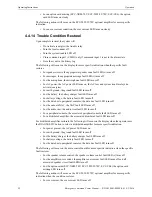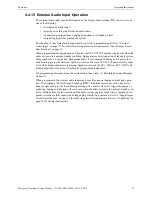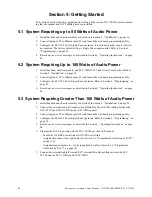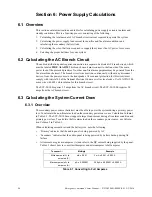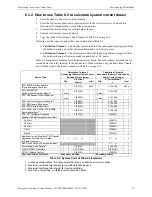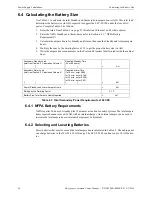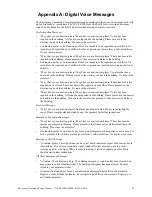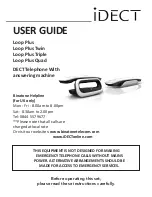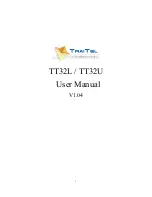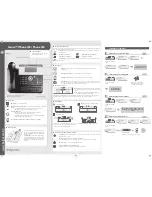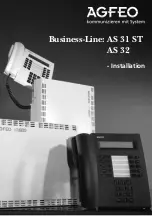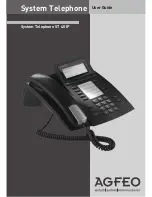
Emergency Command Center Manual —
P/N LS10001-000FL-E:G 5/3/2016
85
LED Indicators
Operating Instructions
ton description. When the operator completes the page, any previously interrupted emergency
broadcast will resume. Previously initiated emergency broadcast will also resume after the push-to-
talk (PTT) switch is held for more than 3 minutes (timer is programmable).
MNS Control
This button is only used when the system is configured for combination fire/mass notification oper-
ation or mass notification only operation.
For mass notification only operation, pressing this button will activate the “MNS active” relay and
the onboard NAC. A second press will de-activate the “MNS active” relay, turn main control board
NAC off, and cancel all broadcasting.
For combination systems (fire and mass notification) where mass notification has a higher priority
through user programming, pressing this button will result in the shutdown of audible FACP NACs
and audio system speakers if they were active for fire. Pressing the button again causes the FACP to
re-activate audible FACP NACs and audio system speakers if they were previously active for fire.
System Control
This button is used to manually gain control of the audio system in preparation for an ALL CALL,
message activation, or general page. The main console will have system priority based upon user
programming. If the main console has higher priority than other system consoles (ECC-LOC, ECC-
RPU, ECC-RM) then the green LED will turn on steady to confirm control. If no other console is in
control then pressing this button is not necessary to gain system control. A second press is required
after paging to relinquish control of the system.
Speaker Select 1-24
These buttons are used to manually activate or deactivate speaker zones (circuits).
Message Select 1-14
These buttons are used to manually activate or deactivate stored messages. If the system has been
programmed for greater than 8 messages then button 8 (the bottom button) becomes a “shift” but-
ton. To activate messages 8 through 14, the user must press the “shift” button followed by a mes-
sage button physically above it. Messages are in priority order where message 1 (the top button) has
highest priority. Pressing a higher priority message button after pressing a lower priority message
button will result in a message override.
For combination fire and MNS applications, messages must be organized per the system priority
setting. For example, if MNS has priority over fire, all MNS messages must be assigned/recorded
to higher priority message buttons than the fire messages. If fire has priority, then all fire messages
must be assigned/recorded to higher priority message buttons than the MNS messages.
Diagnostic Select
This button is used to examine specific trouble conditions for the remote amplifiers (distributed
audio amplifiers). The button is used to select or “scroll” to a specific remote amplifier. The fault
LEDs in the lower center of the display with “wrench” graphics will represent the amplifier
selected. When no amplifier is selected, those fault LEDs represent the main console status.
Trouble Silence
This button is used to manually silence the local trouble sounder.
Console Lamp Test
This button is used to test the console LEDs and local sounder. When pressed, all LEDs temporarily
light and the local sounder is turned on temporarily.
4.3 LED Indicators
Summary of Contents for ECC-50/100
Page 83: ...Emergency Command Center Manual P N LS10001 000FL E G 5 3 2016 83 Notes ...
Page 95: ...Emergency Command Center Manual P N LS10001 000FL E G 5 3 2016 95 Notes ...
Page 102: ...102 Emergency Command Center Manual P N LS10001 000FL E G 5 3 2016 Notes ...
Page 106: ...106 Emergency Command Center Manual P N LS10001 000FL E G 5 3 2016 Slide in Labels ...
Page 108: ...108 Emergency Command Center Manual P N LS10001 000FL E G 5 3 2016 Slide in Labels ...
Page 114: ...Cut along dotted line ...


